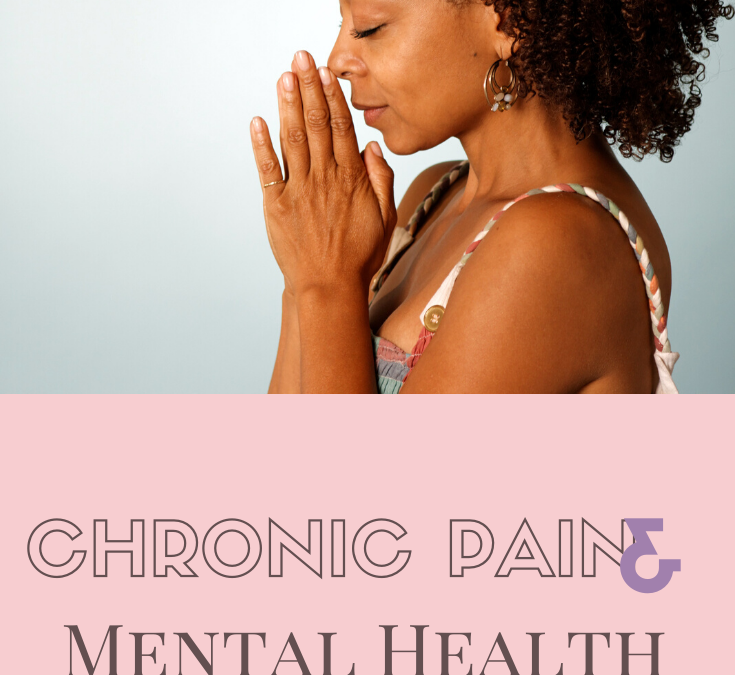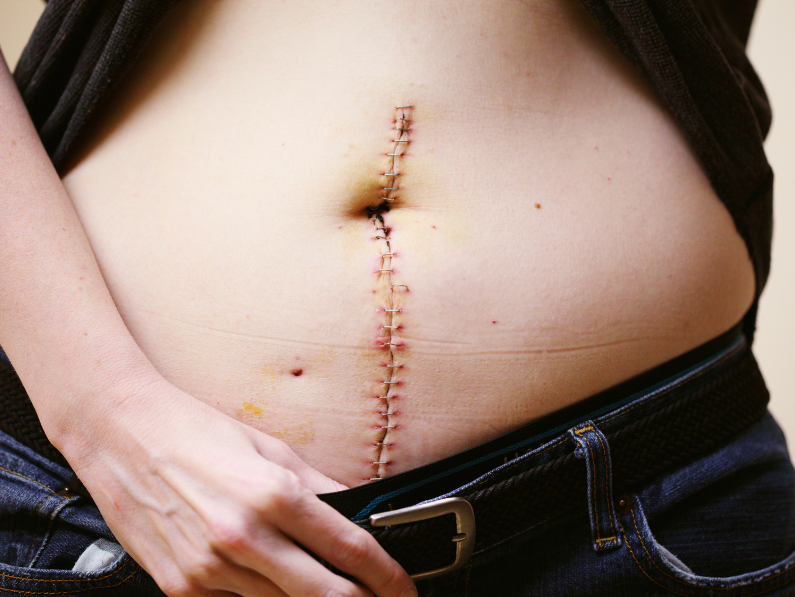The days and months I spent battling chronic pain were challenging and draining. Not just physically but mentally and emotionally. Dealing with the steady hum of daily pelvic pain, lower back pain, sciatica, and digestive distress made life in my body a prison. There was no escape, and I found myself fighting feelings of hopelessness, despair, worthlessness, and self-disgust regularly. Unfortunately, I’m not unique in my chronic pain struggles. Over 200 million women worldwide are diagnosed with endometriosis. And a majority of those women deal with chronic pain consistently. Additionally, there’s increasing evidence that illustrates how endometriosis increases depression and anxiety—especially for those with recurrent chronic pelvic pain. Furthermore, managing these painful symptoms contributes to alterations and changes in a woman’s mental, emotional, and social well-being.
Page Contents
Chronic Pain Decreases Quality of Life
My ADHD led me to struggle with depression and anxiety for the majority of my life. I wasn’t quite ready for how my mental health would take a severe hit after struggling with intense endometriosis symptoms before my diagnosis and surgery. Yet, I found myself falling into a dark pit, which I now believe had everything to do with the ongoing pain I was in. My body was so inflamed and full of endo lesions that regardless of what medication I took, the pain was always present. It would often range from a low, dull ache or throb to a sharp, stabbing, radiating pain. And, I lived like this day in and day out.
Consequently, this led to a decline in the quality of life for me. I wasn’t able to enjoy activities that I loved, and I couldn’t socialize and live the life I’d been able to before. What I experienced is something that researchers are trying to understand by studying how endometriosis impacts mental health. A study on 166 women with endometriosis was conducted to understand the cumulative effect that endometriosis has on a woman’s health holistically and decreased quality of life. The results revealed an increase in depression, sensitivity, and phobic anxiety among women with diagnosed endometriosis. All of which impact the quality of life and erode mental health.
Chronic Pelvic Pain Contributes to Depression
It’s believed that experiencing ongoing chronic pelvic pain (CPP) can increase depression and anxiety. There seems to be research that backs up this idea. A study comparing depression between endo patients with CPP and those without revealed that depression was present in 86% of those with endometriosis and CPP. In contrast, only 38% of endometriosis patients with CPP experienced depression. But, why exactly does CPP increase the rate of depression and anxiety among endo sufferers?
Well, it has a lot to do with the added stress and complications chronic pain of this level brings. In addition to struggling to manage pain and feeling horrible all the time, you still have to adult and perform basic daily tasks. For instance, practicing basic hygiene, getting groceries, cooking, cleaning, seem impossible when you’re in pain. It’s these things that healthy humans take for granted, yet those who are chronically ill are doing these tasks in copious amounts of pain. On good pain days, it’s easier to muddle through. However, on the bad pain days, it’s impossible to function. You’re entirely immobilized. In turn, you can’t go to work, you’re not able to perform your essential duties and live your life. Hence why financial stress is increased.
The Emotional Toll of Chronic Pain
Additionally, chronic pain is effective at wrecking cognitive function, which can increase frustration and emotional turmoil. One reason for this disruption is because pain and inflammation increase fatigue while decreasing proper brain functionality. Complications arise in the form of personality and attitude changes, loss of memory, reduced function, and inability to focus. Additionally, a lack of organization, structure and the energy to do all the things can leave one frustrated, angry, bitter, and short-tempered.
All of which I experienced as a result of endometriosis, which in turn impacted my ability to properly care for myself, complete basic tasks, and function like a human. I wanted to do all the things, but I was trapped inside a body that couldn’t.
Chronic Pain Decreases Ability to Connect
The combination of chronic pain’s physical limitations, emotional impact, and subtle personality shifts can make maintaining healthy social relationships challenging. There’s a social aspect of friendship maintenance that involves shared experiences, and spending quality time with others. Yet, battling against pain makes spending time at events and social gatherings impossible. Sometimes, pushing your body beyond its limits can contribute to flare-ups and increase pain. Additionally, being in physical pain can make you crabby and not fun to be around.
A study conducted on 81 women with pelvic pain in which 40 had endometriosis, and 41 other gynecological issues, revealed that those with endometriosis exhibited specific personality alterations. It was found that endo patients had increased aggressiveness, interpersonal hostility, anxiety, and introversion.
Balancing Chronic Pain with A Career
When I worked full-time as an esthetician dealing with recurrent chronic pain was hard. It took its toll on me emotionally and mentally. And I had to walk away because I couldn’t handle it anymore. Not only was it eroding my physical health but my mental health as well. I wasn’t as productive as I once was, and I found it challenging to perform and function. Hence why I decided to pursue a career that allowed me to work from home and provided flexibility. Yet, not everyone is comfortable transitioning from their jobs or wants to walk away from their career. Which makes juggling chronic pain and career difficult.
There’s tremendous guilt when you have to call into work because of a flare-up or intense pain. Additionally, the fear that you’ll be fired or let go because you have to miss work so often is also present. Therefore, there are many instances in which you take medication and go to work to avoid getting into trouble. And, while medication numbs the pain, you’re still struggling. Many medications and treatments have side effects that impact your ability to concentrate and focus properly. Thus affecting your performance and efficiency. It’s these issues that impact your work performance and make it challenging to perform and pursue a livelihood.
Negative Stigma Also Plays A Role
Additionally, the struggles mentioned above regarding the negative stigma surrounding chronic pain, chronic illness, and endometriosis can also increase mental health issues. Working to overcome myths, misconceptions, and stereotypes makes it hard to gain support from family and friends. Beliefs that a person is “imagining” their pain or that it’s not as bad as they let on to be is damaging and hurtful. Thus causing the sufferer to suppress sharing their feelings and emotions. Instead, they take on a role or “play a part” to make others in their immediate environment feel ok and to show that they can “pull their weight.”
Consequently, this causes the person to downplay their symptoms and condition, which is hazardous to their health.
And, this oppression is something that I struggled with for years. I remember how speaking about my severe pain would lead to others quickly dismissing my experience or downplaying my pain. Thus, suppressing my truth and silencing my voice because my pain didn’t matter since they couldn’t quantify it or it didn’t match their experience. Additionally, it’s not just society that tries to normalize painful periods and other painful endo symptoms. This oppression is also experienced in the doctor’s office. When you’re trying to reach out to a professional and get help, your pain is diminished and trivialized. Instead of addressing the root cause, temporary solutions such as birth control or prescription medication are dispensed. The culmination of this repetitive treatment leads to sufferers believing they are “crazy” and further increases the downward spiral into depression and anxiety.
The Impact of Chronic Pain Is Real
At this moment, I’m currently seven months post-surgery, and the chokehold that chronic pain had on my life has dramatically decreased. Yet, I will never forget the long and challenging journey it took to get here. From years of medical gaslighting, being made out to be crazy by friends and family, and the tumultuous journey towards healing and recovery. How can I forget the sleepless nights full of sobs, the intense flare-ups that held my digestive system hostage. Period pain so severe, I would bang my head against a wall to distract myself from the knife-like stabs in my pelvis. How I made myself push through nausea, vomiting, diarrhea, constipation, sciatica, bloating, and lower back pain until I had a mental breakdown. All while keeping it my secret, private hell.
But, I’m here to tell you that chronic pain is real. It’s not made up, it’s factual. Chronic pain increases depression and anxiety—especially in those with recurrent chronic pelvic pain, painful periods, and severe symptoms. And it destroys mental health, emotional well-being, and the ability to socialize and connect. And, if you’re not taking the impact chronic pain has on mental health and well-being seriously, it’s time that you do.
References
International Journal of Women’s Health 2017; 9: 323-330 published online 2017 May 16th Anxiety and Depression in Patients with endometriosis: impact and management challenges Antonio Simone Laganà, Valentina Lucia La Rosa, Agnese Maria Chiara Rapisarda, Gaetano Valenti, Fabrizio Sapia, Benito Chiofalo, Diego Rossetti, Helena Ban Frangež, Eda Vrtačnik Bokal, and Salvatore Giovanni Vitale.
Endometriosis Net published on June 20, 2018: The connection between endometriosis and mental health
Endometriosis Foundation of America: Endometriosis symptoms: fatigue and personality changes






